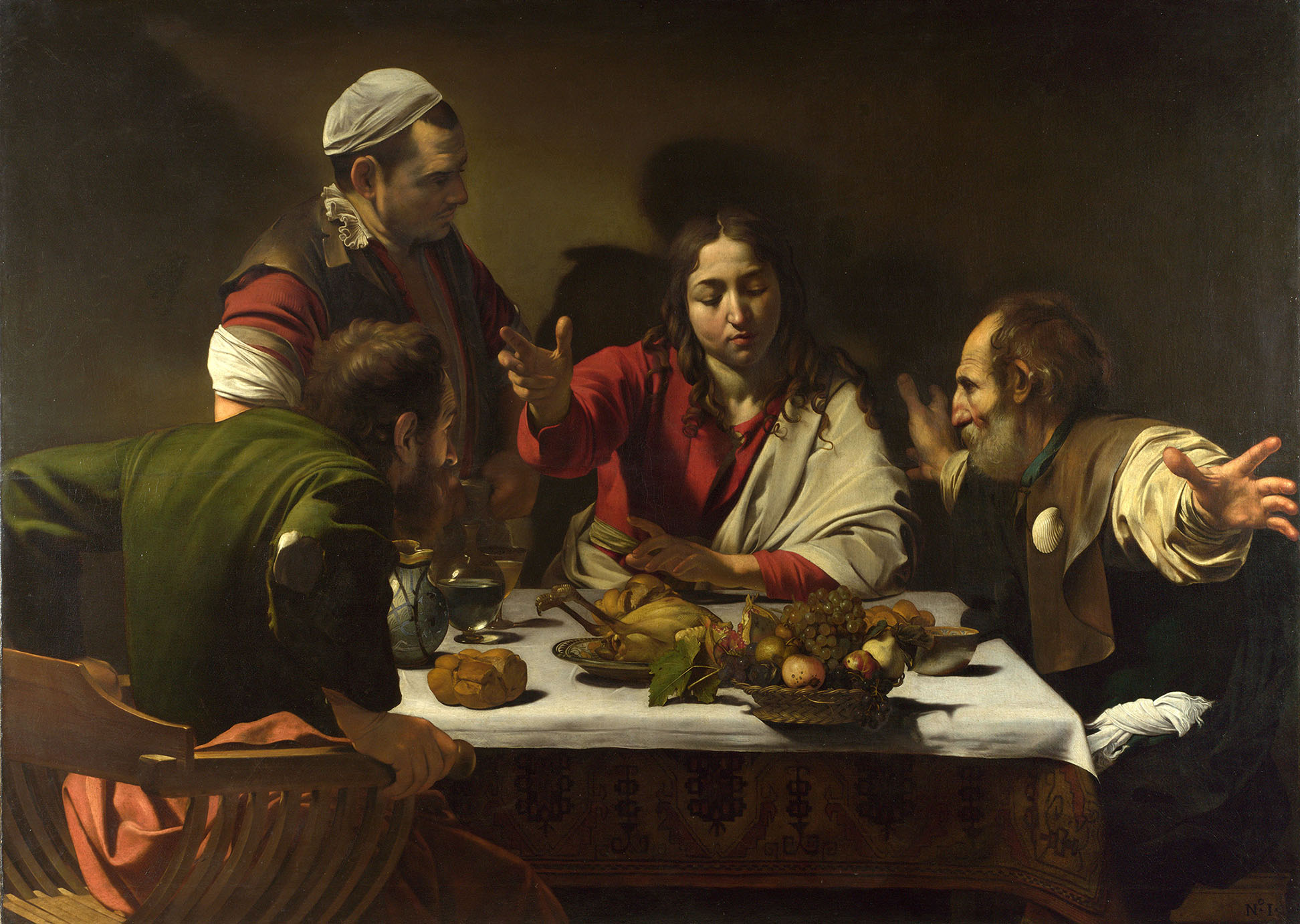Last Words: A Lenten Meditation on the Final Sayings of Christ, Week 8Sample

O Foolish Ones, Don’t You Know?

Supper at Emmaus, Michelangelo Merisi da Caravaggio, 1601. Oil on canvas, 141 x 196.2 cm. National Gallery, London, England. Public Domain.
“Road to Emmaus”—Live Session by The Accord Collective
Poetry:
“The Theology of Doubt”
by Scott Cairns
I have come to believe this fickleness
of belief is unavoidable. As, for these
back lot trees, the annual loss
of leaves and fruit is unavoidable.
I remember hearing that soft-soap
about faith being given
only to the faithful—mean trick,
if you believe it. This afternoon,
during my walk, which
I have come to believe is good
for me, I noticed one of those
ridiculous leaves hanging
midway up an otherwise naked oak.
The wind did what it could
to bring it down, but the slow
learner continued dancing. Then again,
once, hoping for the last
good apple, I reached among
bare branches, pulling into my hand
an apple too soft for anything
and warm to the touch, fly-blown.
O FOOLISH ONES, DON’T YOU KNOW?
Many Christians (including myself) choose not to focus on the blood and gore associated with Christ’s crucifixion. However, to experience the good news of the Resurrection to the fullest, Christians must spend the Season of Lent examining their hearts, asking for forgiveness, and clinging tightly to the One who is the way to Victory.
To progress on their spiritual journey, Christians must believe that Christ has risen from the dead. The response of the Disciples who heard the women tell of the empty tomb and the vision of Angels was one of doubt. Scott Cairns’ poem “The Theology of Doubt” underscores that doubt is “unavoidable” (l. 2) and explains that the desire to understand the “Ways” of God leads to belief. Belief is reserved for those who are faithful––the ones that “the wind did what it could/to bring down, but the slow learner continued dancing” (ll.14-16). The resilient Christians who confront their doubts and seek an authentic relationship with God are well described in Cairns’ words as they progress toward unshakeable faith.
Caravaggio’sSupper at Emmausillustrates Christ’s patience as he repeats from the Scriptures all the details about Himself to those who doubt the women. Caravaggio and Cairns view doubt as a valid component of every Christian’s walk and use their art to portray Christ’s patience and understanding with those who are seeking the Truth. Christ presents infallible proofs of His resurrection; however, he addresses only those who would advance the Kingdom in the future and possess the courage to acknowledge their doubts. Believers today must search the Scriptures in the same way to be armed with the evidence to squelch their doubts and to bring additional Believers into the Kingdom.
It is easy for Christians to lose their joy as they struggle to deepen their relationship with God and consider the brokenness of the world around them. However, C.S. Lewis writes these words to those who are discouraged by the world’s troubles as the Day of Resurrection approaches: “Away with tears and fears and troubles! United in wedlock with the eternal Godhead Itself, our nature ascends into the Heaven of Heaven. So, it would be impious to call ourselves ‘miserable.’ On the contrary, Man is a creature whom the Angels––were they capable of envy––would envy. Let us lift up our hearts! At some future time perhaps even these things it will be a joy to recall” (The Quotable Lewis,p. 175).
Day 49 is part of Bright Week. During this week, Christians greet one another with these words: “Christ is Risen; Christ is Risen Indeed.” It is a time of joy, celebration, and acknowledgement that progress toward greater understanding of God’s ways has occurred. Songs such as The Accord Collective’s “Road to Emmaus” moves the hearts of listeners as they rejoice in the words “Hallelujah! Christ is alive!” and replace any existing doubts with immovable belief.
Prayer:
Having beheld the Resurrection of Christ, let us worship the Holy Lord Jesus, the only Sinless One. We worship Thy Cross, O Christ, and Thy Resurrection we hymn and glorify, for Thou art our God, and we know none other beside Thee, we call upon Thy name. O come, all ye faithful, let us worship Christ’s Holy resurrection: For behold, through the Cross joy hath come to all the world. Ever blessing the Lord, let us hymn His Resurrection; for having endured Crucifixion, He hath destroyed Death by death.
Dr. Christie Curtis
Associate Dean
Graduate Chair, School of Education
Associate Professor
Biola University
Scripture
About this Plan

The Lent Project is an initiative of Biola University's Center for Christianity, Culture and the Arts. Each daily devotion includes a portion of Scripture, a devotional, a prayer, a work of visual art or a video, a piece of music, and a poem plus brief commentaries on the artworks and artists. The Seven Last Words of Christ refers to the seven short phrases uttered by Jesus on the cross, as gathered from the four Christian gospels. This devotional project connects word, image, voice and song into daily meditations on these words.
More
We would like to thank Biola University for providing this plan. For more information, please visit: https://ccca.biola.edu/lent/2025
Related Plans

A Legacy of Faithful Motherhood

No Better News

God's Child

Hustle and Pray: Work Hard. Stay Surrendered. Let God Lead.

Father’s Love: 30 Days of Discovering God as Father

The Bible in Six Acts: The Jesus Bible Study Series

Sukkah: Living in Joy

Why Read the Bible? 30 Reasons Jesus Did

God Selected You
